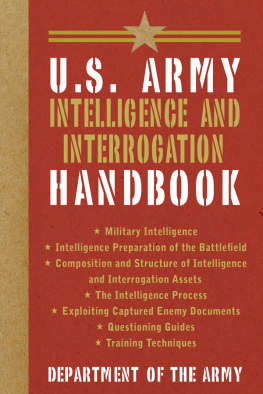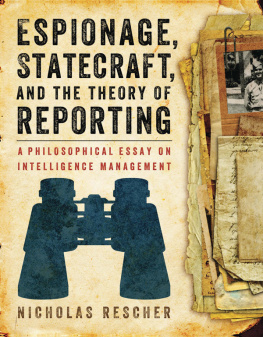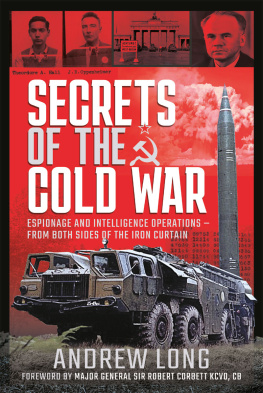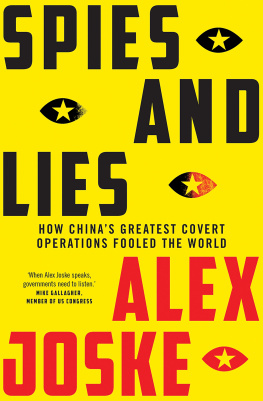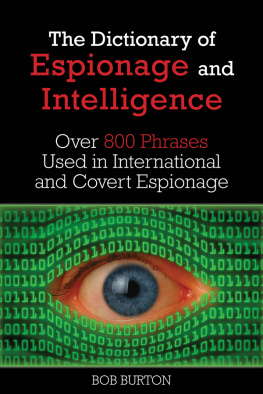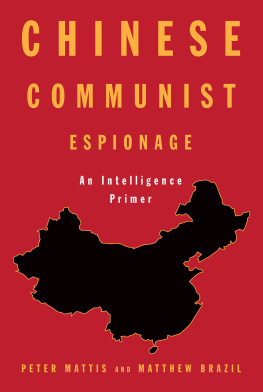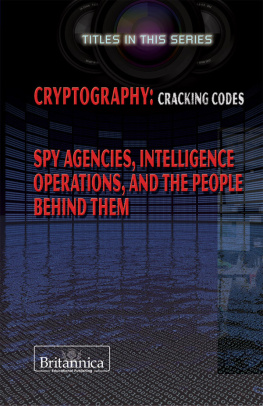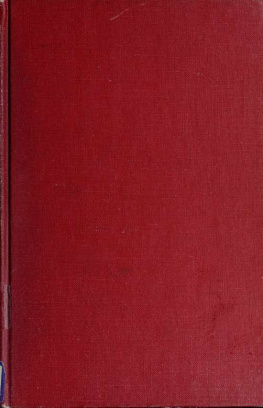First published in 1994 in Great Britain by
FRANK CASS & CO. LTD.
Newbury House, 900 Eastern Avenue, Newbury Park,
Ilford, Essex IG2 7HH, England
This Paperback Edition Published in 1995 by Toppan Company, Limited, Tokyo, Japan, For Sale in Singapore, Malaysia, Brunei, Indonesia, Thailand, Burma, Vietnam, Cambodia, Hong Kong, Taiwan and Korea.
Copyright 1994 Nicholas Eftimiades
British Library Cataloguing in Publication Data
A catalogue record for this book is available from the British Library
ISBN 0 7146 4588 5/TIE 1198
The views expressed in this study are those of the author and should not be construed as representing positions of the Department of Defense or the U.S. government.
All rights reserved. No part of this publication may be reproduced in any form or by any means, electronic, mechanical, photocopying, recording or otherwise, without the prior permission of the publisher.
Printed and bound by Antony Rowe Ltd, Eastbourne
Transferred to digital printing 2005

Confucius, the moralist and teacher of unsurpassed influence in China for millennia, said, Confronting a foreign invasion, one should resort to deception, which may suffice in repelling the enemy. Yet when his Western counterpart Socrates advocates wile and guile in the name of national security, we are not sure how to respond. This professed emphasis on covert operationsunfettered, to Western eyes, by any ethical constraintsis distinctly Chinese, with deep historical roots. In Chinese statecraft the use of spies is not incompatible with higher principles. Indeed, in his Art of War Sun Tzu gives top priority to the employment of espionage for humanitarian reasons, among others: in war, lack of the foreknowledge supplied by secret agents would entail heavy loss on the people. In light of Chinas past one begins to understand the relentless endeavors of the PRC government in pursuing its intelligence objectives, aided by a vast network of chameleonic agents abroad and penetrative bureaucracies at home. Chinese government and society construe the notion of intelligence in the broadest possible sense.
Nicholas Eftimiadess remarkable sensitivity to Chinas strategic tradition sets his book apart from its competitors in this rapidly expanding field. Adroitly avoiding the pitfall of mirror-imaging, he provides a nuanced, systematic, and in-depth examination of the extensive modern-day Chinese intelligence machine and discusses a wide range of policy-related issues of rising importance. The tone of the book reflects not only insight into the past but also a keen awareness of the present and the future. Eftimiades has actively explored valuable sources newly made available by the increasing permeability of Chinese society, enabling him to assess the strengths and weaknesses of Chinas intelligence services beyond the confines of conventional wisdom. In addition, a delightful writing style unexpectedly accompanies the thoroughness of a rigorous analyst and the serious nature of the topic. Combining his academic background as a sinologist and his professional training as an intelligence officer, Eftimiades makes a unique contribution to the study of intelligence services and of the current state of the Peoples Republic of China.
Chong-Pin Lin
resident scholar, A MERICAN E NTERPRISE I NSTITUTE
Contents
Guide
This book is the product of three years of interviews, documentary research, and analysis. Many people assisted me during those years, and in this short space I cannot possibly acknowledge them all. Please indulge me as I present my most profound thanks to all those who answered my routine pleas for help.
Special thanks to Mike Deckert, who raised my computer from the dead and kept in runningfriends dont come any better than Mike. In reviewing this work Lee Livingston, Monty Slocomb, Susan Lawrence, and Hayden Peake proved that that which does not kill us makes us stronger. Lee, Charles Luker, and Col. Pat Niemann, USA (ret.), defended my academic integrity and exemplified the meaning of loyalty when jealous bureaucrats failed to understand how an intelligence analyst could think, read, and write outside the work environment.
Thanks to all the scholars who encouraged me to write this work and who supported me in the process. Portions of this book first appeared in Occasional Papers and Reprints in Contemporary Asian Studies, no. 2 (1992), published by the University of Maryland School of Law. Interviews conducted by Michael Swaine, Ph.D., and the International Campaign for Tibet were invaluable sources of information. Also, my most sincere appreciation goes to those Chinese intelligence officers, diplomats, dissidents, and other sources who spent time with me and provided information literally at their own risk.
Acknowledgments would be incomplete without recognizing Richard W. Marsh, Jr., who spent hundreds of hours wading through documents and who conducted a number of interviews in support of this work. His research talents and fortitude are truly exceptional. Also, I must thank my loving wife, Deborah, for designing the illustrations on short notice. Deborah and our children, Stephanie, Sophia, and Theodore, had a profound effect on this book. Without their love, affection, constant attention, and Theos inability to distinguish day from night, I would have been done a year ago.
Summary of the Meeting of Educational Counselors (Consuls) in Chinese Embassies and Consulates
In March 1990 the State Education Commission convened a meeting of educational counselors in Chinese embassies and consulates. The speakers included He Dongchang, vice chairman of the State Education Commission; Teng Teng, who outlined the situation in the Soviet Union and Eastern Europe as well as a propaganda campaign prepared by the Partys Propaganda Department; officials from the Ministry of Public Security and the Ministry of National Security, who explained policies concerning the Front for Democracy in China, the Chinese Alliance of Democracy, and other organizations; Zuo Zhengfeng from the Foreign Ministry, who discussed the status of Chinas relations with the United States and Canada; and officials from the Partys Ministry of Organization, who described the organizations active among Chinese students and scholars in the United States and Canada. He Dongchang summed up the main points presented at the meeting, and an abstract of the session was signed by Li Peng. The original Chinese text of the summary appears at the end of this translation.
1. International and Domestic Situations
The basic theory of Marxs scientific socialism is not wrong; the idea that Marxism-Leninism is out of date must be firmly criticized.
The changes in the Soviet Union and Eastern Europe did not represent the mainstream of history; they were serious setbacks in the development of socialism.
The failure of Ceausescu lied in dissociation from the masses, poor management of the economy, and the Soviet intervention.
The present international situation is similar to that of the 1894-1914 period, when capitalism made some headway in a peaceful environment and the international labor movement was disrupted by the opportunism that emerged from the Second International.
The new thinking of Gorbachev is a more thorough negation of Stalin and is not doing any good to the international communist movement.
The changes in the Soviet Union and Eastern Europe have brought about difficulties. The hard times for the peoples of these countries have just begun. Economic reform cannot be accomplished in an unstable situation. Eastern Europes foreign debts total $170 billion, and the current foreign loans are just enough to pay the interest. Polands open market is economically unsound. The Soviet Union faces the problem of Lithuania. Now each West German state covers an East German district, and Bavaria covers Hungary and Czechoslovakia. East Germany is an exception. Other Eastern European countries are going to have a hard time.



